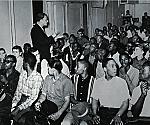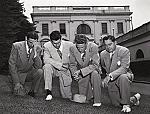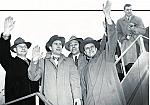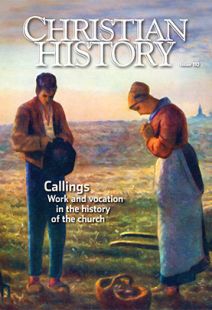Recommended resources: Vocation
Books
• The landscape of books devoted to the vocation of Christians through the ages is vast. The modern era has in fact seen an explosion of books devoted to discerning calling and living out faith in the workplace, including Mark Albion’s Making a Life, Making a Living, Gene Edward Veith’s God at Work, Parker Palmer’s Let Your Life Speak, Os Guinness’s The Call, Dean Brackley’s Call to Discernment in Troubled Times, John Paul II’s The Meaning of Vocation, Gilbert Meilander’s Freedom of a Christian, Timothy Keller and Katherine Leary Alsdorf’s Every Good Endeavor, Steve Garber’s Visions of Vocation, and Amy Sherman’s Kingdom Calling. Even more can be found via The Marketplace Annotated Bibliography: A Christian Guide to Books on Work, Business and Vocation by Pete Hammond, R. Paul Stevens, and Todd Svanoe.
• Going back into history to see how Christian brothers and sisters in the past understood their vocations, the best place to start is William Placher’s anthology Callings: Twenty Centuries of Christian Wisdom on Vocation. In addition to providing testimonies from Christians as diverse as Ignatius of Antioch and Dorothy Day, the book also sets each excerpt in context and gives overall introductions on how vocation was viewed in different eras of church history. Both Callings and a follow-up volume focusing on literature and philosophy, Leading Lives that Matter (edited by Mark Schwehn and Dorothy Bass), have online study guides available (www.ptev.org/news.aspx?iid=56 and www.ptev.org/news.aspx?iid=60).
• Robert Ellsberg’s The Saints’ Guide to Happiness, All Saints, and Blessed among All Women offer capsule biographies with a vocational slant of spiritual leaders of various faiths, where “well-known saints, apostles, and martyrs take their places beside lesser-known figures (the woman with a flow of blood who touched Jesus’ hem), theologians and philosophers (Martin Buber, Simone Weil, Kierkegaard), artists (Van Gogh, Mozart, J. S. Bach), literary figures (Dante, Tolstoy), social reformers (Gandhi, Schweitzer), and numerous others who do not fit into neat categories.”
A somewhat more traditional collection of spiritual biographies can be found in the They Knew Their God series by E. F. and Lillian Harvey—though many of the callings here are to “church work,” others display a variety of vocations.
• It can be worthwhile to simply read good biographies of Christians of the past with an eye to how they lived out their vocations. But some books do deal with vocation in specific eras of the church or in the lives of specific Christians. A thorough list of these can be found in the bibliographies maintained by Programs for the Theological Exploration of Vocation (at www.ptev.org/indexer.aspx?sect=resources&tid=-10&iid=3).
• Examples include R. Paul Stevens’s The Other Six Days and Work Matters, on vocation in the Bible; Lawrence Cunningham’s Francis of Assisi; James Martin’s Becoming Who You Are: Insights on the True Self from Thomas Merton and Other Saints; primary-source reflections on vocation such as George Herbert’s The Country Parson and Rainer Maria Rilke’s Letters to a Young Poet; the historical analysis of André Vauchez’s The Laity in the Middle Ages; Gustaf Wingren’s Luther on Vocation; D. Michael Bennethum’s Listen! God Is Calling! Luther Speaks of Vocation, Faith, and Work; and Paul Marshall’s A Kind of Life Imposed on Man: Vocation and Social Order from Tyndale to Locke.
• Famous modern reflections from several popes on issues of work and economics—in ways that guide vocational discernment—include the encyclical Rerum novarum and the pastoral constitution Gaudium et spes. David Miller’s God at Work: The History and Promise of the Faith at Work Movement traces the history of various largely lay-led “faith and work” groups, existing and even thriving still today, who consider ways to integrate the claims of their faith with the demands of their work. And although it is a book about work rather than a book about faith, you might also enjoy Studs Terkel’s Working, a classic reflection in which, as its subtitle says, “people talk about what they do all day and how they feel about what they do”—with profound implications for how the church might respond.
Christian History issues
• Read back issues at the CH website ( www.christianhistorymagazine.org/magazine/) or purchase print copies of available issues at www.christianhistoryinstitute.org/storefront/. Past issues that touch on the topic of vocation include
2, 69: The Wesleys
12: John Calvin
14, 19: Money in Christian History
24: Bernard of Clairvaux
34, 39: Martin Luther
49: Everyday Faith in the Middle Ages
89: Richard Baxter and the English Puritans
93: Benedict and Western Monasticism
94: Building the City of God in a Crumbling World
104: Christians in the New Industrial Economy
Videos from Vision Video
• In addition to offering many biographies—such as those of David Livingstone, David Brainerd, John Wesley, St. Patrick, and Gladys Aylward—Vision Video currently distributes Called: Vocation as an Expression of Faith and The Calling, and will be releasing as companion videos to this issue of Christian History the two-part series Going on Vocation: Exploring Work as It Was Meant to Be.
Websites
• Reflections on work and vocation in the Bible can be found at the Theology of Work Project, www.theologyofwork.org, organized both topically (search particularly “vocation,” “calling,” and “meaning and value of work”) and by Biblical book.
In addition to maintaining the bibliographies and study guides mentioned above, Programs for the Theological Exploration of Vocation (www.ptev.org/default.aspx) has many other resources for exploring vocation—throughout church history or in your own life—including everything from movie reviews to streaming DVDs to course syllabi. Some interesting articles on vocation throughout church history and in the modern world are at www.christianitytoday.org/mediaroom/news/2013/leadership-journal-re-examines-christian-vocation.html (some are subscriber-only access, but not all).
• Some other sites with practical everyday reflections on vocation include Practicing Our Faith (for adults, www.practicingourfaith.org) and Way to Live (for teens, www.waytolive.org), the Washington Institute for Faith, Vocation, and Culture (www.washingtoninst.org), The High Calling (www.thehighcalling.org), and Patheos Faith and Work Channel (www.patheos.com/Faith-and-Work). CH
By the Editors
[Christian History originally published this article in Christian History Issue #110 in 2014]
Next articles
Jesus was not a white man
Billy Graham asked Howard Jones to become a living experiment in racial progress
Edward GilbreathMama was “a real theologian”
In marrying Ruth Bell, Billy Graham acquired a strong-willed partner, a shrewd father-in-law, and a heritage of Presbyterian purposefulness
Anne Blue WillsConfessor-in-chief
Billy Graham shared the spotlight—and moments of intimate prayer—with more presidents than any other Christian leader
Stephen Rankin“Go forth to every part of the world”
Billy Graham’s early missions to Europe helped shape a global evangelical movement
Uta BalbierSupport us
Christian History Institute (CHI) is a non-profit Pennsylvania corporation founded in 1982. Your donations support the continuation of this ministry
Donate







